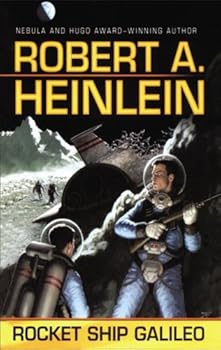
![]() Rocket Ship Galileo by Robert A. Heinlein
Rocket Ship Galileo by Robert A. Heinlein
When I was a kid I loved the “Heinlein Juveniles.” Rocket Ship Galileo, Heinlein’s first Juvenile, is one I missed back then. It won’t hold up well today (actually, it wouldn’t have held up well when I was reading Heinlein Juveniles in the 1980s) but sometimes it’s fun to read these old science fiction stories for kids and I did have fun recently reading Rocket Ship Galileo even though I am very much aware of its flaws. Let’s remember that it was published in 1947, just after World War II and well before we managed to put a man on the moon.
Ross, Art, and Morrie (I love those retro names!) are three teenage boys who love science and each have special geeky skills. When Morrie’s uncle, a Nobel Prize-winning nuclear physicist, discovers that the boys are building a rocket ship, he gives them some funds and a little help and off they all go to the moon. When they get there they discover that they’re not the first ones there. The humans who’ve covertly come before have dangerous plans. Can the boys stop them before the bad guys destroy the Earth?
Okay, that’s just fun, right? In the year 2013 it’s impossible to take Rocket Ship Galileo seriously. I don’t know if they did back in 1947. I suspect not because I doubt anyone thought it was possible to build a space ship in your backyard or to mail order space suits and asbestos shoes. Still, boys can dream, and Rocket Ship Galileo is definitely an exciting dream, especially when you get to not only fly to the moon, but kill Nazis and save the Earth on top of it all. Too cool!
Other than the outlandishness of it all, the main problem with Rocket Ship Galileo is all the teachy technobabble. Some of it is real science, some of it is made up (I hope kids can tell this apart), most of it is dated, and a lot of it is boring because it’s delivered in Uncle Cargraves’ lessons or the boys recitation of what they’ve previously learned. Heinlein has an issue with this in his adult novels, too. If the lessons don’t turn kids off they might enjoy experiencing the fantasies of teenage boys in the 1940s.
The audiobook I listened to was narrated by Spider Robinson who has the tone just right. When he narrates the boys’ parts he sounds appropriately wide-eyed, innocent, and geeky. Golly, Mr. Robinson, great job!



Do it! One of the best things I've read in recent years.
This reminds me. I want to read Addie LaRue.
We’re in total agreement David!
I felt just the same. The prose and character work was excellent. The larger story was unsatisfying, especially compared to…
Hmmm. I think I'll pass.